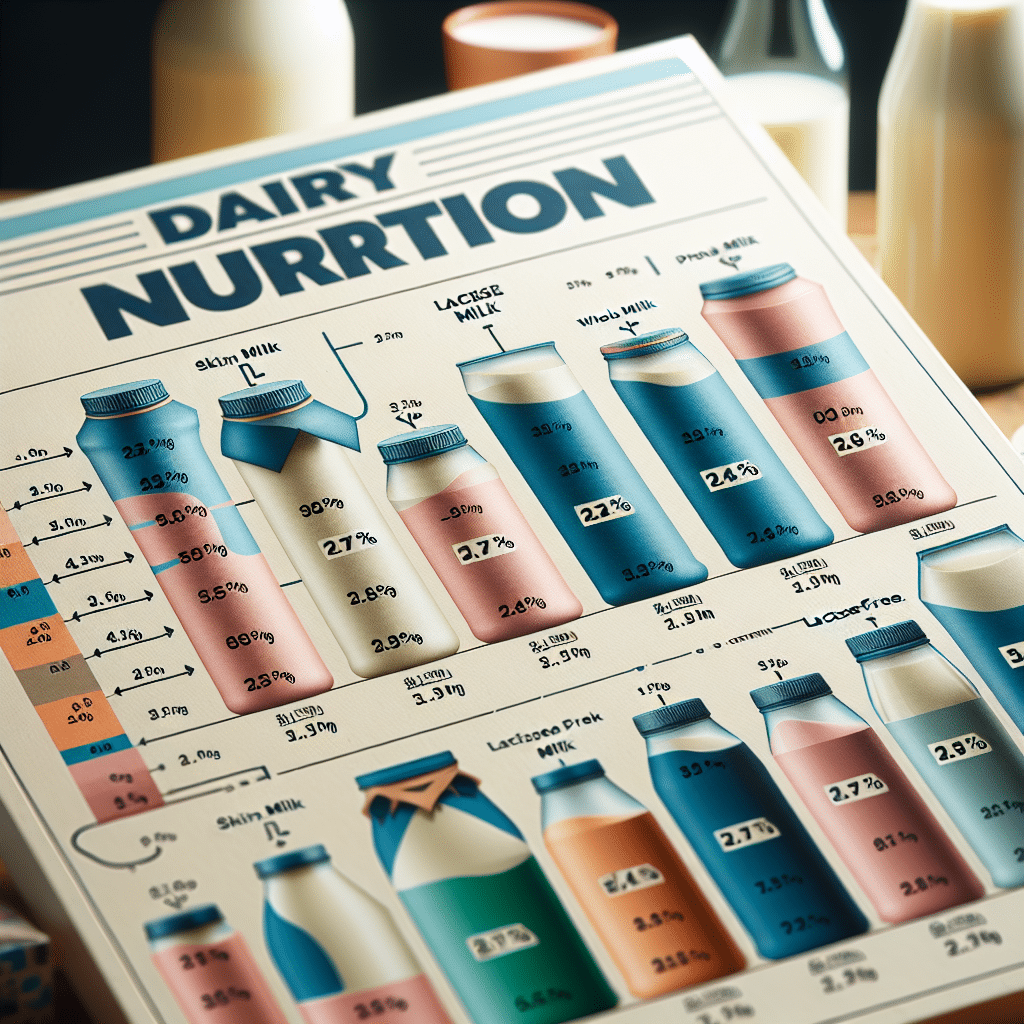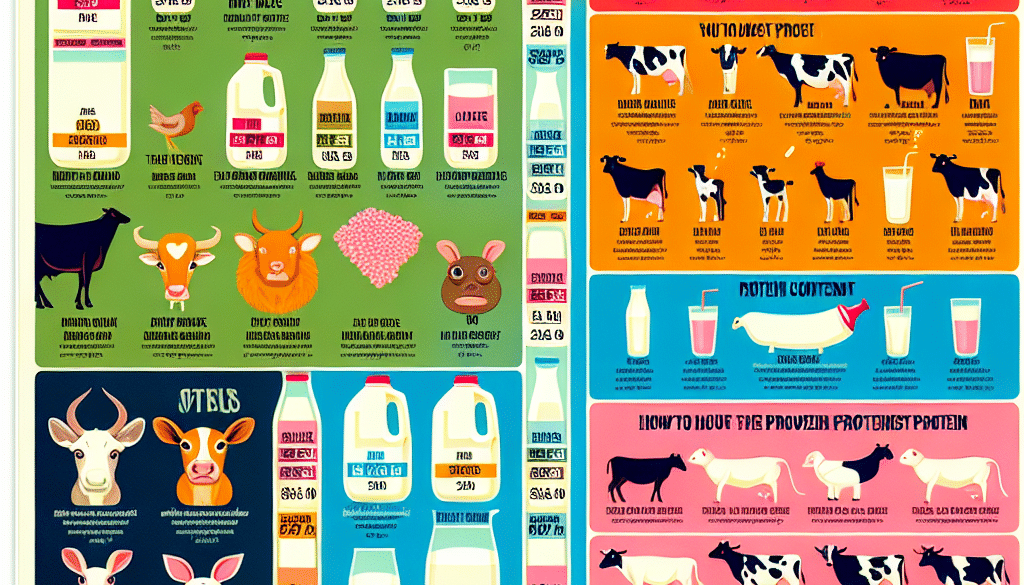Milk with Most Protein: Dairy Nutrition Guide
-
Table of Contents
- Milk with Most Protein: Dairy Nutrition Guide
- Understanding Protein in Milk
- Types of Milk and Their Protein Content
- Comparing Milk to Plant-Based Alternatives
- Benefits of High-Protein Milk
- Case Studies and Statistics
- Choosing the Right Milk for Your Protein Needs
- Conclusion: The Power of Protein-Rich Milk
- Discover ETprotein’s High-Quality Protein Products
Milk with Most Protein: Dairy Nutrition Guide

When it comes to protein-rich foods, milk is often a go-to source for many. Not only is it widely available, but it also contains a host of other essential nutrients, making it a staple in many diets around the world. However, not all milk is created equal in terms of protein content. In this comprehensive guide, we’ll explore the different types of milk, their protein content, and the benefits of incorporating high-protein milk into your diet.
Understanding Protein in Milk
Protein is a crucial macronutrient necessary for building and repairing tissues, making enzymes and hormones, and supporting immune function. Milk protein is of high quality because it contains all nine essential amino acids required by the human body. The two main types of protein found in milk are casein and whey. Casein accounts for about 80% of milk protein, while whey makes up the remaining 20%.
Types of Milk and Their Protein Content
Different types of milk vary in their protein content. Here’s a look at some of the most common types of milk and how much protein they offer:
- Whole Milk: Whole milk is the least processed form of milk. It contains about 3.4% protein, translating to approximately 8 grams of protein per 8-ounce serving.
- Skim Milk: Skim milk, also known as nonfat milk, has had the fat removed. It contains slightly more protein than whole milk, with about 8.3 grams per serving.
- 2% Milk (Reduced-Fat): This milk has some of the fat removed, containing about 8.1 grams of protein per serving.
- 1% Milk (Low-Fat): With even less fat than 2% milk, 1% milk provides around 8.2 grams of protein per serving.
- Organic Milk: Organic milk comes from cows that have not been treated with antibiotics or growth hormones. The protein content is similar to conventional milk, but some studies suggest that organic milk may have a higher concentration of certain nutrients.
- Lactose-Free Milk: Lactose-free milk is cow’s milk with the lactose removed, making it suitable for lactose-intolerant individuals. The protein content remains comparable to regular milk.
- Fortified Milk: Some milk is fortified with additional protein, often reaching up to 10 grams or more per serving.
Comparing Milk to Plant-Based Alternatives
With the rise of plant-based diets, many people are turning to non-dairy milk alternatives. Here’s how some popular plant-based milks stack up in terms of protein content:
- Soy Milk: Soy milk is the closest plant-based alternative to cow’s milk in terms of protein, with about 7 to 8 grams per serving.
- Almond Milk: Almond milk is low in protein, typically offering only 1 to 2 grams per serving unless fortified.
- Oat Milk: Oat milk generally provides about 3 grams of protein per serving, though this can vary by brand.
- Rice Milk: Rice milk is also low in protein, with about 1 gram per serving.
- Pea Protein Milk: Pea protein milk is a newer entrant to the market and can contain as much protein as cow’s milk, around 8 grams per serving.
Benefits of High-Protein Milk
Consuming milk with a higher protein content can offer several health benefits:
- Muscle Growth and Repair: Protein is essential for muscle growth and repair, making high-protein milk an excellent choice for athletes and those engaged in regular physical activity.
- Weight Management: Protein can help you feel fuller for longer, potentially aiding in weight management by reducing overall calorie intake.
- Bone Health: Milk is not only rich in protein but also calcium and vitamin D, which are vital for maintaining strong bones.
- Immune Support: The antibodies and immune factors in milk can help support the immune system.
Case Studies and Statistics
Research has consistently shown the benefits of high-protein diets for various health outcomes. For instance, a study published in the American Journal of Clinical Nutrition found that higher protein intake was associated with increased muscle mass and strength in older adults. Another study in the Journal of Nutrition Education and Behavior reported that teenagers who consumed high-protein milk after exercise experienced better muscle recovery.
Choosing the Right Milk for Your Protein Needs
When selecting milk based on protein content, consider your dietary needs, any allergies or intolerances, and your overall health goals. For those looking to maximize protein intake, choosing skim or fortified milk may be the best option. However, if you’re following a plant-based diet, soy milk or pea protein milk could be suitable alternatives.
Conclusion: The Power of Protein-Rich Milk
In conclusion, milk is a versatile and nutrient-dense food that can play a significant role in a balanced diet. Whether you choose cow’s milk or a plant-based alternative, opting for a high-protein option can support muscle health, weight management, and overall well-being. By understanding the different types of milk and their protein content, you can make informed choices that align with your nutritional needs.
Discover ETprotein’s High-Quality Protein Products
If you’re looking for additional ways to incorporate protein into your diet, consider exploring ETprotein’s range of plant-based protein products. Their offerings, including organic rice protein, pea protein, and other seed-based proteins, provide excellent alternatives for those seeking non-dairy sources of high-quality protein.
About ETprotein:
ETprotein, a reputable plant protein vegan protein Chinese factory manufacturer and supplier, is renowned for producing, stocking, exporting, and delivering the highest quality organic bulk vegan protein and plant proteins. They include Organic rice protein, clear rice protein, pea protein, clear pea protein, watermelon seed protein, pumpkin seed protein, sunflower seed protein, mung bean protein, peanut protein etc. Their offerings, characterized by a neutral taste, non-GMO, allergen-free attributes, cater to a diverse range of industries. They serve nutraceutical, pharmaceutical, cosmeceutical, veterinary, as well as food and beverage finished product distributors, traders, and manufacturers across Europe, USA, Canada, Australia, Thailand, Japan, Korea, Brazil, and Chile, among others.
ETprotein specialization includes exporting and delivering tailor-made protein powder and finished nutritional supplements. Their extensive product range covers sectors like Food and Beverage, Sports Nutrition, Weight Management, Dietary Supplements, Health and Wellness Products, and Infant Formula, ensuring comprehensive solutions to meet all your protein needs.
As a trusted company by leading global food and beverage brands and Fortune 500 companies, ETprotein reinforces China’s reputation in the global arena. For more information or to sample their products, please contact them and email sales(at)ETprotein.com today.












